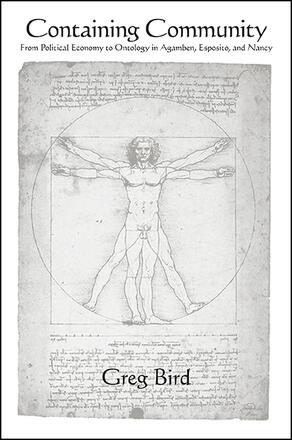
Containing Community
From Political Economy to Ontology in Agamben, Esposito, and Nancy
Alternative formats available from:
Analyzes the role of community in the writings of Giorgio Agamben, Roberto Esposito, and Jean-Luc Nancy.
Description
Winner of the 2017 Symposium Book Award presented by Symposium: Canadian Journal of Continental Philosophy
Community has been both celebrated and demonized as a fortress that shelters and defends its members from being exposed to difference. Instead of abandoning community as an antiquated model of relationships that is ill suited for our globalized world, this book turns to the writings of Giorgio Agamben, Roberto Esposito, and Jean-Luc Nancy in search for ways to rethink community in an open and inclusive manner. Greg Bird argues that a central piece of this task is found in how each philosopher rearticulates community not as something that is proper to those who belong and improper to those who are excluded or where inclusion is based on one's share in common property. We must return to the forgotten dimension of sharing, not as a sharing of things that we can contain and own, but as a process that divides us up and shares us out in community with one another. This book traces this problem through a wide array of fields ranging from biopolitics, communitarianism, existentialism, phenomenology, political economy, radical philosophy, and social theory.
Greg Bird is Assistant Professor of Sociology at Wilfrid Laurier University, Canada, and the coeditor (with Jonathan Short) of Community, Immunity and the Proper: Roberto Esposito.
Reviews
"In this book, Greg Bird identifies and radically conceptualizes being-with as the problematic node that connects thinkers who in other respects are quite diverse such as Agamben, Esposito, and Nancy. His interpretation, acute and rigorous, illuminates in an admirable fashion a decisive passage of contemporary thought." — Roberto Esposito, author of Communitas: The Origin and Destiny of Community
"In this exceptional book, Greg Bird offers for the first time in English a rigorous account of the common philosophical origins of Nancy, Agamben and Esposito's work on community. By emphasizing the centrality of the proper in the ontology of being in common and tracing it back to Heidegger, Bird places Nancy, Agamben, and Esposito at the center of contemporary economico-political philosophical debates." — María del Rosario Acosta López, DePaul University
In Containing Community Greg Bird asks how we might imagine community in such a way that 'being' and not 'having' comes to the fore. His answer, contained across some truly marvelous readings of Proudhon, Marx, Heidegger, and then Nancy, Agamben, and Esposito surprises and delights especially for his take-down of the proprietary prejudice featured so frequently in how we conceive of community. It also happens to be one of the best books to appear in recent memory on Italian thought." — Timothy C. Campbell, Cornell University